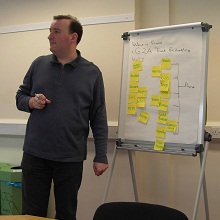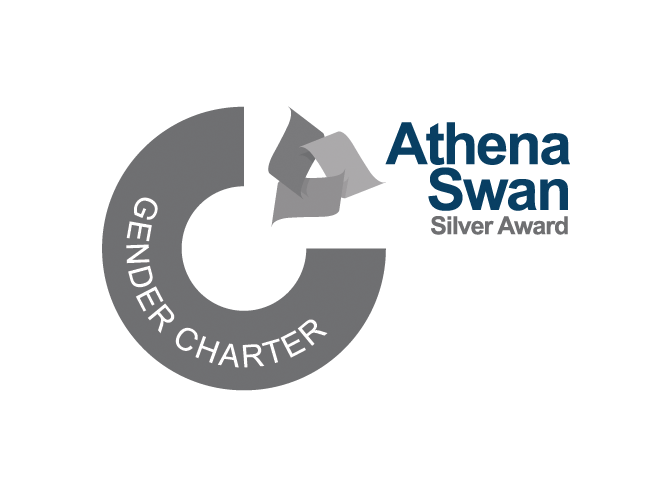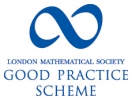Student stories
Kath Taylor
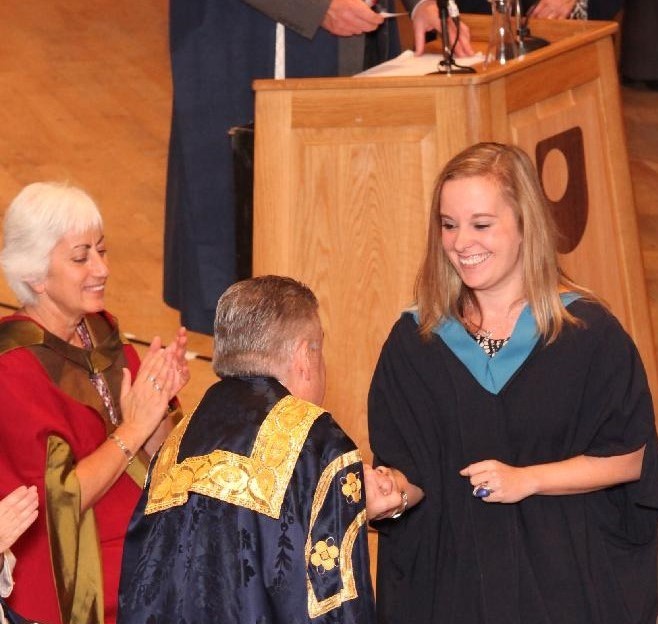
Kath Taylor is a Principal Pricing Analyst within the Motor Retail department of a major UK-wide general insurance company. She has a BSc (Hons) in Mathematics from the Open University and is currently a student actuary nearing the end of studies to become a Fellow of the Institute and Faculty of Actuaries.
Why did you decide to study with the OU?
I completed the first year of a degree which had a strong mathematical link at a "bricks and mortar university" back in 2003 and then decided to park my studies for overseas travel. In 2006 I was living in Europe and had some spare time so I selected a 2nd year OU course on the History of Maths. I had intended it to be a one-off course that was in a topic that interested me but I was hooked. I initially went back to 1st year courses and confirmed that I hadn't forgotten all I had learnt previously before deciding if Mathematics or Statistics was the topic for me. I moved back to the UK a year later and my studies followed, fitting around my new job and other commitments.
Describe your experiences of studying for your OU qualification
I was in my 20s when I started studying and working in part-time roles, so the pressures on me were not really job related but social. It was hard knowing my friends were all out enjoying the sunshine while I was revising. However I had a supportive boss who was happy for me to complete my weekly hours over 4 days so I had a 'study day' once a week when needed. I used these days to work on the assignments and attend the tutorials but when exams were looming there was a step-up in the commitment required and I was often studying on weekends and evenings too. I felt meeting the tutors helped build communication with them and I was less afraid to ask for help after I'd put a face to a name. The M500 revision weekends were invaluable for the later subjects and well worth the extra commitment.
What have you done since you finished studying?
I was often asked what I was planning to 'do' with my degree once I'd finished, as I was working in non-skilled roles at the time. I had stumbled upon the Actuarial profession while researching careers and immediately began job hunting after I completed my degree. I was lucky enough to land a Junior Actuarial Analyst role with a Leeds based insurance broker within a few months. Although being a qualified actuary is not essential for the field I work in it is something I wanted to do. However it does require more exams and I found that my experience with the OU left me in good stead to continue studying. It's been 7 years since I gained my degree and I'm nearing the end of the exams and have progressed from a junior analyst to a senior member of the team.
How have your OU qualifications helped your career?
Without my degree I would never have started upon this career path nor have the job that I have today. To study the actuarial exams there is an expectation that you already have a degree and on many actuarial job descriptions it explicitly states that it is a requirement. Actuaries work on risk in many areas of business but the early exams are extremely maths heavy. My degree gave me excellent grounding in mathematical principles and helped make sense of some of the new topics.
What advice would you offer to a prospective student considering study at the OU?
Don't underestimate the amount of time and dedication it will take to complete the degree but the frequent assignments and tutor feedback will help keep you on track. Once you have a study routine set up, stick to it but also allow yourself time to relax and have that time in the sun with your friends. Many workplaces now have a budget for further learning so explore what support you can get beforehand, be it financial or flexibility in work schedule. The end result is most definitely worth it!
David Worsley
David Worsley is the Risk & Value Manager for Network Rail's London North Eastern Route, and is also a Visiting Lecturer at the Centre for Railway Research at Newcastle University. He has a Diploma in Statistics, Certificate in Mathematics, and a Certificate in Quantitative Studies for Business from the Open University.
Why did you decide to study with the OU?
I did maths A-Level, but I don’t think the real-world applications were properly explained at school, so I didn’t study any maths for almost 15 years. Ten years ago, I was working in the railway industry, and I was given a job as a project risk analyst, based partly on the little maths that I did know. I realised that in order to pursue that career fully I would need to expand my knowledge of statistics in particular, so I undertook the Certificate in Quantitative Studies for Business, Certificate in Mathematics, and Diploma in Statistics at the OU. I did enough maths in these three qualifications to be eligible for full membership of the Institute of Mathematics and Its Applications, which I obtained in 2010.
Describe your experience of studying for your OU qualifications.
The period during which I was studying mathematics with the Open University was very demanding, as I was adjusting to a new job and undertaking a professional qualification with the Institute of Risk Management at the same time. My employer gave me study leave and paid for that course, but I did the OU qualifications in my own time and at my own expense; the incentive that kept me going was the realisation that after three years of hard work I would be qualified in both the managerial and mathematical aspects of my new profession, and thereby in a very strong position to progress in the rail industry.
What made my success possible was the high standard of tuition I received at the OU; a two-hour tutorial from each tutor seemed to impart as much knowledge as days of reading alone. I found myself travelling to adjacent regions when possible in order to benefit from additional tutorials, and I attended the OU mathematics revision weekend at Aston University.
What have you done since you finished studying?
Shortly after completing the Diploma in Statistics, I moved to a job in strategic planning at Network Rail, and I eventually rose to be responsible for long-term planning of the East Coast Main Line. I thus had the opportunity to use maths in cost estimating, demand forecasting, economic modelling, and strategic decision analysis; in particular, all of these applications were used by the committee that chose the locations for the stations on High Speed 2, on which I represented Network Rail’s interests. I was once even involved in an engineering simulation project, examining the perennial problem of “leaves on the line”, in which I used techniques that I had learnt on an OU probability course.
I’m back working in project risk management again now, but in a more senior role which has allowed me to help expand the responsibilities of the department to include the complicated statistical analysis required for whole-life cost modelling of new assets. Network Rail intends that this initiative will save the taxpayer over £3 billion in costs over the next 20 years. I also teach many of these applications of mathematics as a Visiting Lecturer at Newcastle University’s Centre for Railway Research, and in this capacity I have been nominated to take part in a European Union funded project that will share this knowledge at a series of conferences across the continent over the next 3 years.
How have your OU qualifications helped your career?
The effort that I put in to studying at the OU in my mid-30s in order to become a qualified mathematician meant that as I turned 40 my career really accelerated, and I now have the opportunity to make a contribution to the railway industry at an international level. As mathematics underlies both risk analysis and many of the tools used in strategic planning, I have been able to make an impact in two professional fields, and I’m now enjoying teaching what I have learnt at University level myself.
What advice would you offer to a prospective student considering study at the OU?
The first suggestion that I would make is that new students plan their studies so that they can pick up intermediate qualifications on their path to a full degree; the prospect of earning certificates or diplomas along the way should make the potential six-year study period seem more digestible. You can also experience a sense of achievement when each qualification is gained, which helps to motivate you for future efforts.
Meanwhile, my main advice would be to take full advantage of tutorials; the opportunity to interact with your tutor and really concentrate on what you are being taught can often make difficult mathematical topics suddenly become comprehensible.
Irina Lisovyy
.jpg)
A single OU module gave Irina Lisovyy the extra maths credits she needed to secure her spot on a postgraduate teacher training course, paving the way to her new career as a maths teacher. Read more about Irina's story here.
Max Little
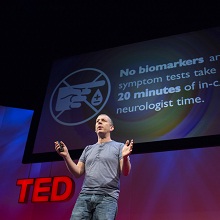
Max Little is a lecturer and Wellcome Trust-MIT Fellow in the Nonlinearity and Complexity Research Group at Aston University,a Visiting Assistant Professor at MIT and Founder and Chief Scientific Officer at NumericAnalysis Ltd consulting. He has a B.Sc. in mathematical sciences from the OU, as well as a D.Phil. in Applied Mathematics from the University of Oxford.
Why did you decide to study with the OU?
Working in video games on DSP algorithm development I became fascinated by the control that mathematical modelling could provide. This triggered an understanding that mathematics could be both very powerful in practice and intrinsically beautiful. You could say I caught the 'maths bug'!
Describe your experience of studying for your OU qualifications
It was certainly not easy studying at the same time as holding down a demanding full-time job, and I didn't make it easy on myself by choosing to study well over my recommended number of annual credits! But, the extremely well-organized OU material and study plans made it possible for me to achieve a high first-class result, which impressed Oxford enough to allow me to go on to study a D.Phil. there. The support of excellent OU tutors was incredibly helpful in achieving this.
What have you done since you finished studying?
It's been a long road! I finished up my D.Phil. at Oxford in 2007 and since then I have held a number of postdoc and consulting jobs on a variety of topics, including systems biology and rainfall prediction at Oxford and MIT in the US. I have also made many contributions to mathematical and statistical algorithms for analyzing behavioural signals such as voice and accelerometry in neurological disorders. I'm now a mathematics lecturer at Aston.
How have your OU qualifications helped your career?
The OU allowed me to change careers by giving me the opportunity to study my passion - mathematics - while earning a living. After postdoc positions in Oxford and co-founding a web-based image search business, I won a Wellcome Trust fellowship at MIT to follow up on my doctoral research work in biomedical signal processing. I am currently a Lecturer in Complex Systems, Pattern Analysis and Information Mathematics at Aston University, a Wellcome Trust-MIT Postdoctoral Research Fellow, a Visiting Assistant Professor at MIT and Founder and Chief Scientific Officer, NumericAnalysis Ltd consulting.
What advice would you offer to a prospective student considering study at the OU?
Be ambitious, but realistic: ensure that you have good plans in place in order to hit the strict and quite numerous deadlines. Try to explore the subject as much as you can; mathematics is learned by doing not by passively absorbing information.
Karine and Sarah Mather
.jpg)
For Edinburgh-based married couple Karine and Sarah Mather, studying with The Open University (OU) has been invaluable in giving them both a focus while coping with the challenges of Karine’s primary progressive multiple sclerosis (PPMS). Read about Sarah’s experiences of studying for an OU Mathematics and Physics degree here.
David Platt

David Platt is a research fellow at the University of Bristol. His computational work played a major part in Harald Helfgott's proof of the Weak Goldbach Conjecture last year, for which David won the first ever Gold medal in the mathematical sciences section of the 2014 "SET for Britain" event. He has a BSc in mathematics from the OU (and could list other non-OU qualifications too!)
Why did you decide to study with the OU?
I got back into mathematics aged 40 something after nearly 20 years in industry. When my children reached GCSE/A Level I did an A Level at a local Tertiary college, just in an effort to keep up. I got bitten by the bug and wanted to do more. The OU was the perfect avenue.
Describe your experience of studying for your OU qualifications
It was flexible enough to fit in round my other commitments and no more expensive than my other hobbies (that is all it was at this stage). I did not have to commit to more than one module at a time, but knew that the route to a degree was there if I stuck with it. The quality of the teaching materials was especially impressive and the tutorials and the summer school were delivered with enthusiasm and humour.
What have you done since you finished studying with the OU?
After 5 years of very enjoyable study, I graduated, but still wanted more. My OU degree was enough to get me a postgraduate position at Bristol under Andrew Booker and 3 and a bit years later I defended my thesis in Analytic Number Theory. Since then, I have worked at the University as a Research Fellow. I mix with mathematicians from undergraduate to FRS and at no time have I been made to feel my degree is in any way "second rate" not having been awarded by a traditional institution.
I was lucky enough to collaborate with Harald Helfgott from the ENS in Paris and help him to prove the Ternary Goldbach Conjecture which had been annoying us since 1742. My role was to design more efficient and rigorous algorithms to perform the massive computations Harald needed to support his work. The poster I submitted to SET Britain described these computations and was awarded first prize in the Mathematics section. Harald has been invited to talk at the International Congress of Mathematics at Seoul this year which shows how important his result is.
How have your OU qualifications helped your career?
Put simply, without my OU degree, it would not have been possible for me to follow an academic career path. In addition, thinking back to my previous existance as an employer, I recognised that a maths degree demonstrated an ability to solve problems in a structured and repeatable way. Regardless of the actual course followed, being able to successfully complete an OU degree requires the capacity to manage ones time when faced with conflicting priorities. This is a key skill that any business will appreciate highly.
What advice would you offer to a prospective student considering study at the OU?
For what it is worth, I regard the OU as one of this country's crowning achievements. I am proud to be an alumnus and sing its praises at every opportunity.
Cathie Wells

Cathie Wells is a third year PhD student at the University of Reading. As a member of the Mathematics of Planet Earth Centre for Doctoral Training, she is researching fuel optimal trajectories for aircraft, in a bid to make necessary long-haul flight more sustainable. The first part of her research was widely covered in the media and even led to discussions with NATS, the UK’s main provider of air traffic control services. During her studies she has also had the opportunity to work on a joint project with the Met Office.
Why did you decide to study with the OU?
When I finished my degree in 1996, I was very tempted to go straight into a PhD, but I felt I had to teach, as I had a family to support. Seventeen years later, however, inspired by my confident and ambitious sixth form Further Mathematicians, I decided it was time to learn more myself. I completed my OU MSc in Mathematics over four years, studying one day a week whilst teaching the other four. The material from the modules I worked on was fascinating and I was even able to weave some of it into activities for my top sixth formers, so they had a taste of where Mathematics could take them. I wasn’t exactly sure what I would do with the qualification at the end of the MSc, it was more a case of enjoying each module as I went along.
Describe your experience of studying for your OU qualifications
I found the coursebooks and interactive lectures very well set out, but the best thing about OU study was having helpful tutors to talk to about the material, either virtually or at the study weekends. I also made extensive use of each module’s recorded examples so I could work through them at my own speed.
Working on my own was a bit daunting at first, but the regular feedback on coursework as I built up to the exams was very encouraging. Meeting up with other students at the study weekends was a highlight each year and we were able to give each other advice when it came to choosing the next modules. I studied one module in the first year, two for the next two years and then completed my dissertation in the final year. This was a good balance with the demands of my job and family. The range of modules available was broad, so I was able to get a feel for many different areas of mathematics.
What have you done since you finished studying with the OU?
Initially I continued teaching, but after the first term with no extra studies I decided to start looking for PhD places. Luckily, I found one course combining Mathematics with Meteorology, which was an area I’d long been interested in. My interview was all about the material I had covered in my OU MSc degree and at one point I was handed a board pen and asked to explain what my dissertation was about, in painstaking detail!
I spent the first year of the new course completing an MRes so I could learn more about weather related mathematics. From there I went straight on to the PhD, which I hope to complete this time next year. My research, reformulating Trans-Atlantic flight routes to minimise fuel burn and thus emissions, uses optimal control theory, which is based on the calculus of variations, a topic I first came across during my MSc. My first academic paper was published in January 2021 and led to articles in the international press, some live radio interviews and even the chance to be part of a Met Office podcast. During my studies I also attend aviation and mathematics conferences (albeit virtually at the moment) to present my research and network with other mathematicians.
How have your OU qualifications helped your career?
Most importantly, completing an MSc with the OU has proved to me that I can still study Mathematics at a high level. Without the OU I would not have had the confidence to stop teaching and start learning fulltime again. The qualification also paved the way to my being able to apply for a PhD, as my first degree had been completed so long ago.
Studying with the OU was a great way to gain the self-discipline to work through material on my own, as I have had to when researching. The material I covered in my first OU module and in my dissertation formed the basis of my understanding of my current research, so it has been critical in my progress through my PhD.
What advice would you offer to a prospective student considering study at the OU?
Look at the courses available and plot your journey before you start. Try to have a set time each week when you can study. This doesn’t always happen and some weeks you’ll need more time than others, but it gives you a baseline to work from. Talk your tutor, especially at first. I had a few wobbly moments, but talking to my tutors always reassured me. Make the most of the study weekends to chat with other students. Always give plenty of time to the coursework tasks, so you can use feedback from these as a way to chart your progress.
Above all, just go for it, you won’t regret it!
